Ethical Considerations in Nursing: A Case Study of Patient Care
VerifiedAdded on 2020/03/04
|9
|2365
|34
Report
AI Summary
This report presents a comprehensive analysis of a nursing ethics case study involving an 85-year-old dementia patient, Mr. P, residing in a nursing home. The assignment explores the ethical complexities faced by a nursing student, particularly concerning Mr. P's ill-fitting dentures and the conflicting desires of his granddaughter. The report delves into key concepts of ethical practice, including the importance of respecting patient autonomy and the need for effective communication between healthcare providers, patients, and their families. It examines the ethico-legal implications of different courses of action, emphasizing the significance of following health and social care legislations. The student demonstrates ethical awareness through self-reflection using Driscoll's Reflective Framework Model, analyzing their responses to the situation. The report integrates relevant literature and resources to support key ideas, highlighting the impact of ethical practices on the quality of care and the importance of collaboration with families. It underscores the need for nursing students to develop a strong understanding of their roles and responsibilities in providing patient-centered care, especially when dealing with complex cases involving dementia and family dynamics. The report emphasizes the need for ethical practices, the importance of communication, and the value of adapting to the needs of patients and their families.
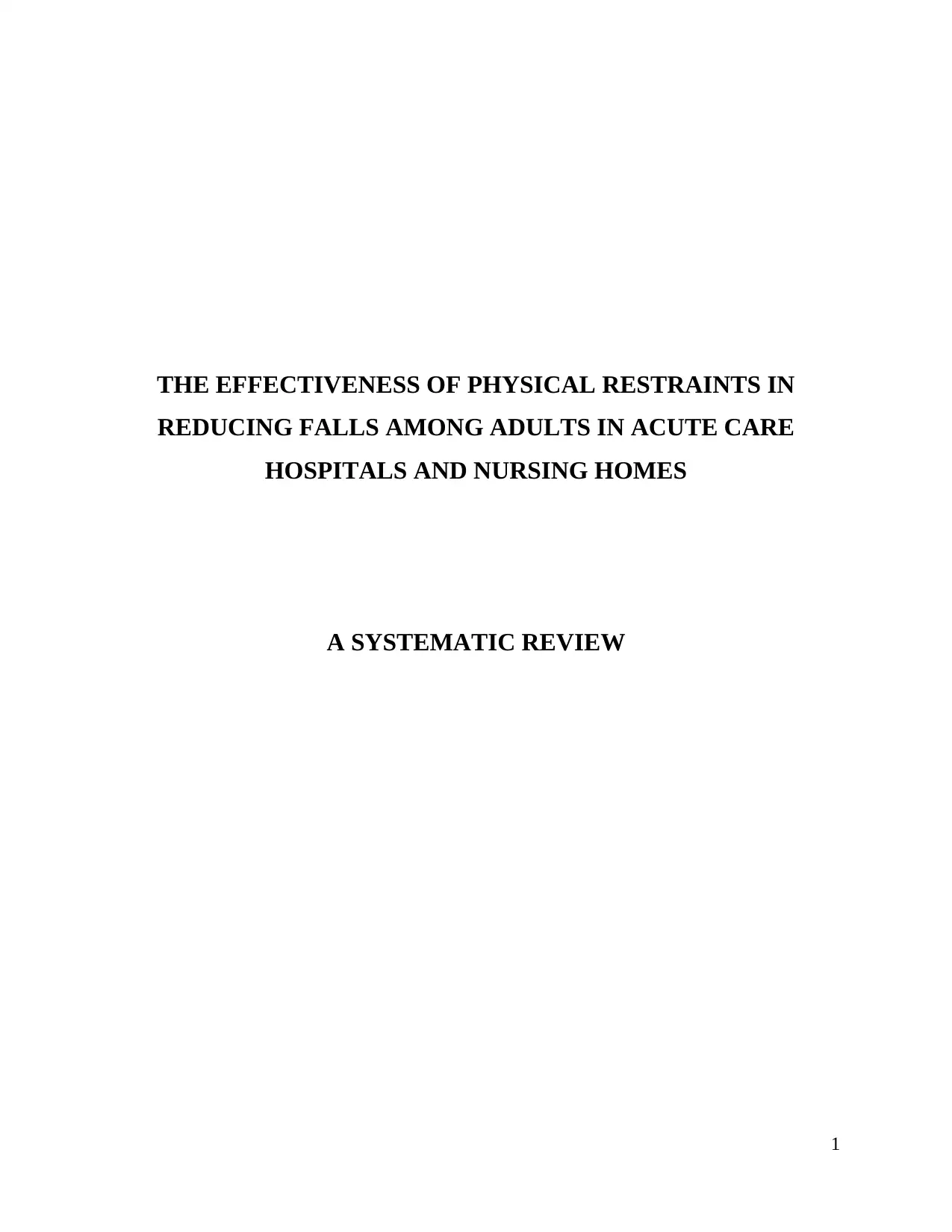
THE EFFECTIVENESS OF PHYSICAL RESTRAINTS IN
REDUCING FALLS AMONG ADULTS IN ACUTE CARE
HOSPITALS AND NURSING HOMES
A SYSTEMATIC REVIEW
1
REDUCING FALLS AMONG ADULTS IN ACUTE CARE
HOSPITALS AND NURSING HOMES
A SYSTEMATIC REVIEW
1
Paraphrase This Document
Need a fresh take? Get an instant paraphrase of this document with our AI Paraphraser
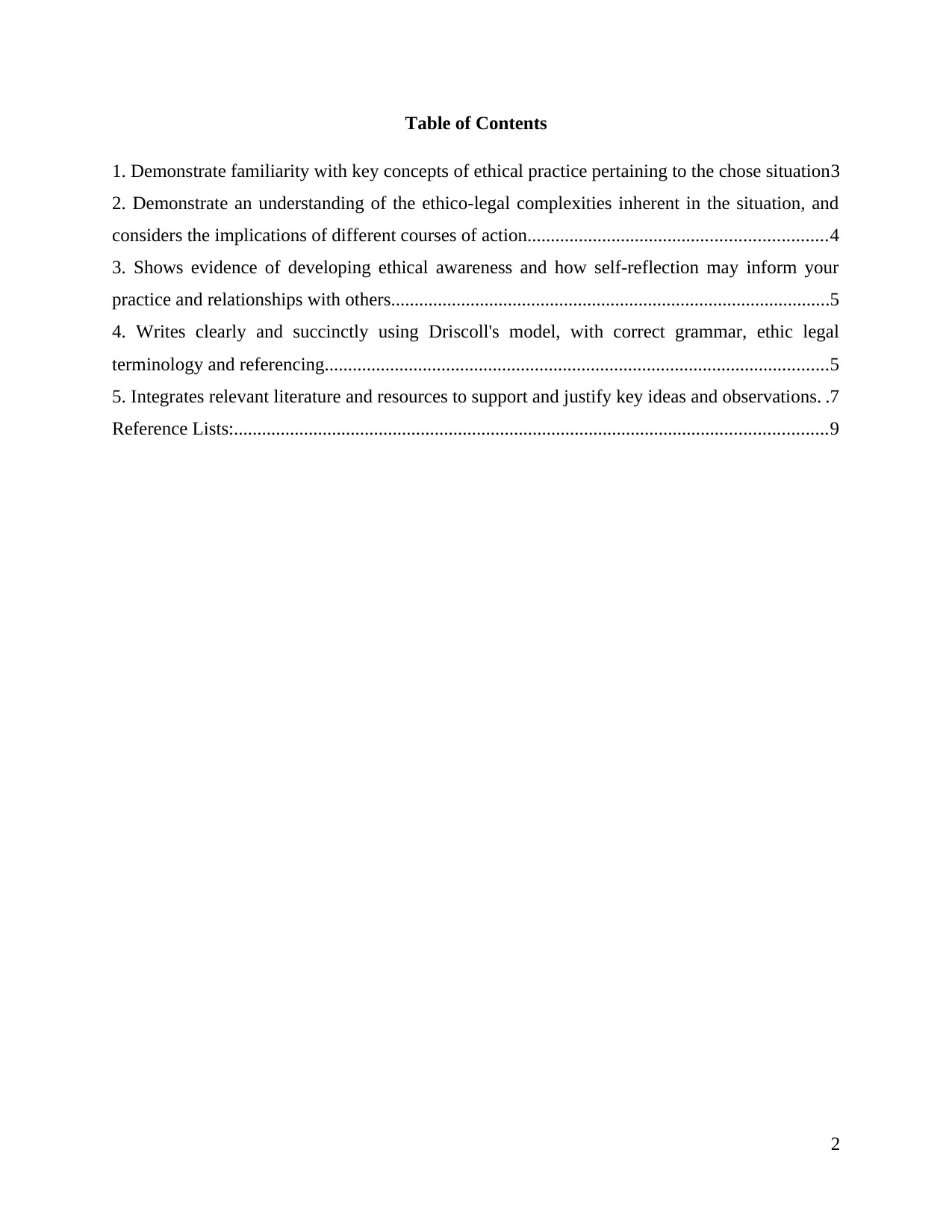
Table of Contents
1. Demonstrate familiarity with key concepts of ethical practice pertaining to the chose situation3
2. Demonstrate an understanding of the ethico-legal complexities inherent in the situation, and
considers the implications of different courses of action................................................................4
3. Shows evidence of developing ethical awareness and how self-reflection may inform your
practice and relationships with others..............................................................................................5
4. Writes clearly and succinctly using Driscoll's model, with correct grammar, ethic legal
terminology and referencing............................................................................................................5
5. Integrates relevant literature and resources to support and justify key ideas and observations. .7
Reference Lists:...............................................................................................................................9
2
1. Demonstrate familiarity with key concepts of ethical practice pertaining to the chose situation3
2. Demonstrate an understanding of the ethico-legal complexities inherent in the situation, and
considers the implications of different courses of action................................................................4
3. Shows evidence of developing ethical awareness and how self-reflection may inform your
practice and relationships with others..............................................................................................5
4. Writes clearly and succinctly using Driscoll's model, with correct grammar, ethic legal
terminology and referencing............................................................................................................5
5. Integrates relevant literature and resources to support and justify key ideas and observations. .7
Reference Lists:...............................................................................................................................9
2
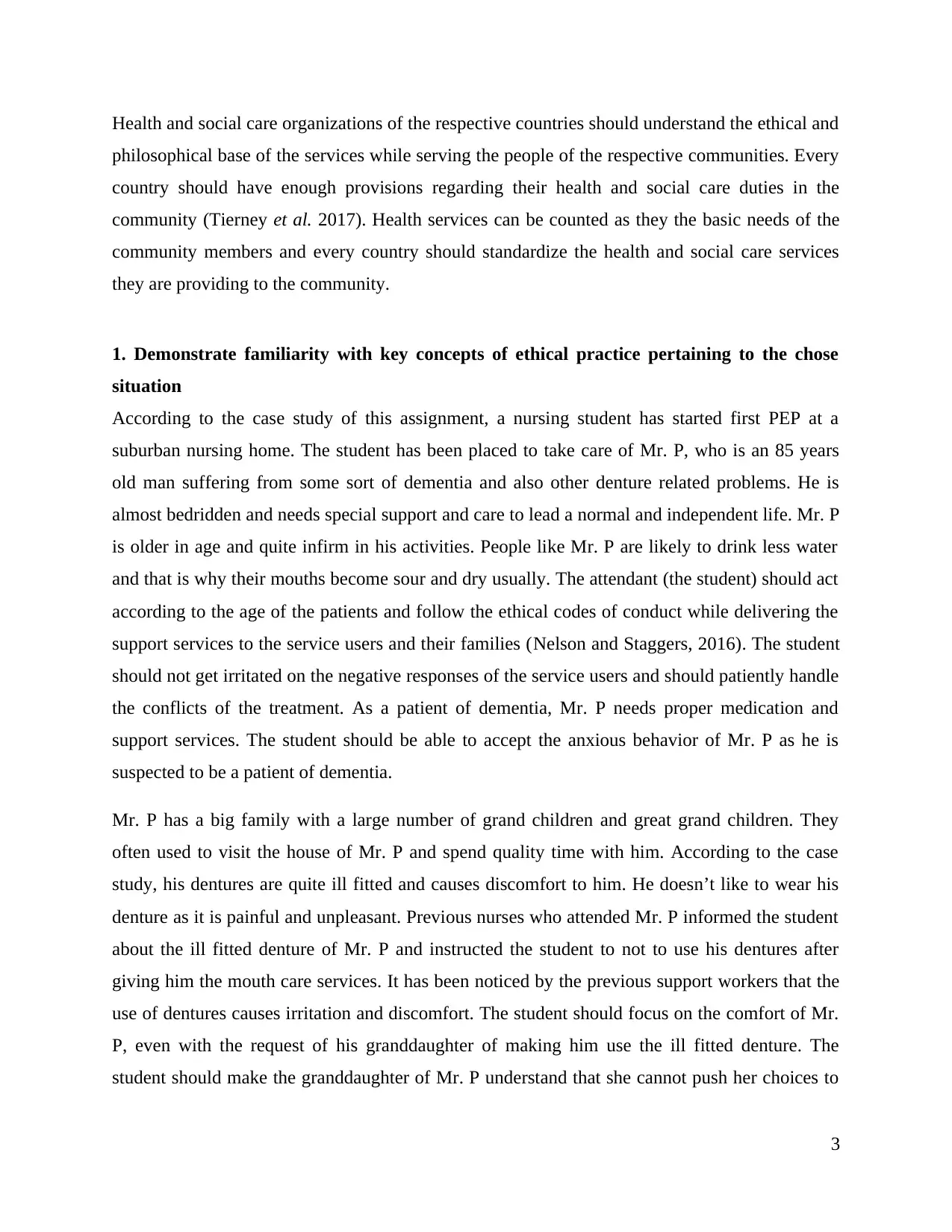
Health and social care organizations of the respective countries should understand the ethical and
philosophical base of the services while serving the people of the respective communities. Every
country should have enough provisions regarding their health and social care duties in the
community (Tierney et al. 2017). Health services can be counted as they the basic needs of the
community members and every country should standardize the health and social care services
they are providing to the community.
1. Demonstrate familiarity with key concepts of ethical practice pertaining to the chose
situation
According to the case study of this assignment, a nursing student has started first PEP at a
suburban nursing home. The student has been placed to take care of Mr. P, who is an 85 years
old man suffering from some sort of dementia and also other denture related problems. He is
almost bedridden and needs special support and care to lead a normal and independent life. Mr. P
is older in age and quite infirm in his activities. People like Mr. P are likely to drink less water
and that is why their mouths become sour and dry usually. The attendant (the student) should act
according to the age of the patients and follow the ethical codes of conduct while delivering the
support services to the service users and their families (Nelson and Staggers, 2016). The student
should not get irritated on the negative responses of the service users and should patiently handle
the conflicts of the treatment. As a patient of dementia, Mr. P needs proper medication and
support services. The student should be able to accept the anxious behavior of Mr. P as he is
suspected to be a patient of dementia.
Mr. P has a big family with a large number of grand children and great grand children. They
often used to visit the house of Mr. P and spend quality time with him. According to the case
study, his dentures are quite ill fitted and causes discomfort to him. He doesn’t like to wear his
denture as it is painful and unpleasant. Previous nurses who attended Mr. P informed the student
about the ill fitted denture of Mr. P and instructed the student to not to use his dentures after
giving him the mouth care services. It has been noticed by the previous support workers that the
use of dentures causes irritation and discomfort. The student should focus on the comfort of Mr.
P, even with the request of his granddaughter of making him use the ill fitted denture. The
student should make the granddaughter of Mr. P understand that she cannot push her choices to
3
philosophical base of the services while serving the people of the respective communities. Every
country should have enough provisions regarding their health and social care duties in the
community (Tierney et al. 2017). Health services can be counted as they the basic needs of the
community members and every country should standardize the health and social care services
they are providing to the community.
1. Demonstrate familiarity with key concepts of ethical practice pertaining to the chose
situation
According to the case study of this assignment, a nursing student has started first PEP at a
suburban nursing home. The student has been placed to take care of Mr. P, who is an 85 years
old man suffering from some sort of dementia and also other denture related problems. He is
almost bedridden and needs special support and care to lead a normal and independent life. Mr. P
is older in age and quite infirm in his activities. People like Mr. P are likely to drink less water
and that is why their mouths become sour and dry usually. The attendant (the student) should act
according to the age of the patients and follow the ethical codes of conduct while delivering the
support services to the service users and their families (Nelson and Staggers, 2016). The student
should not get irritated on the negative responses of the service users and should patiently handle
the conflicts of the treatment. As a patient of dementia, Mr. P needs proper medication and
support services. The student should be able to accept the anxious behavior of Mr. P as he is
suspected to be a patient of dementia.
Mr. P has a big family with a large number of grand children and great grand children. They
often used to visit the house of Mr. P and spend quality time with him. According to the case
study, his dentures are quite ill fitted and causes discomfort to him. He doesn’t like to wear his
denture as it is painful and unpleasant. Previous nurses who attended Mr. P informed the student
about the ill fitted denture of Mr. P and instructed the student to not to use his dentures after
giving him the mouth care services. It has been noticed by the previous support workers that the
use of dentures causes irritation and discomfort. The student should focus on the comfort of Mr.
P, even with the request of his granddaughter of making him use the ill fitted denture. The
student should make the granddaughter of Mr. P understand that she cannot push her choices to
3
⊘ This is a preview!⊘
Do you want full access?
Subscribe today to unlock all pages.

Trusted by 1+ million students worldwide
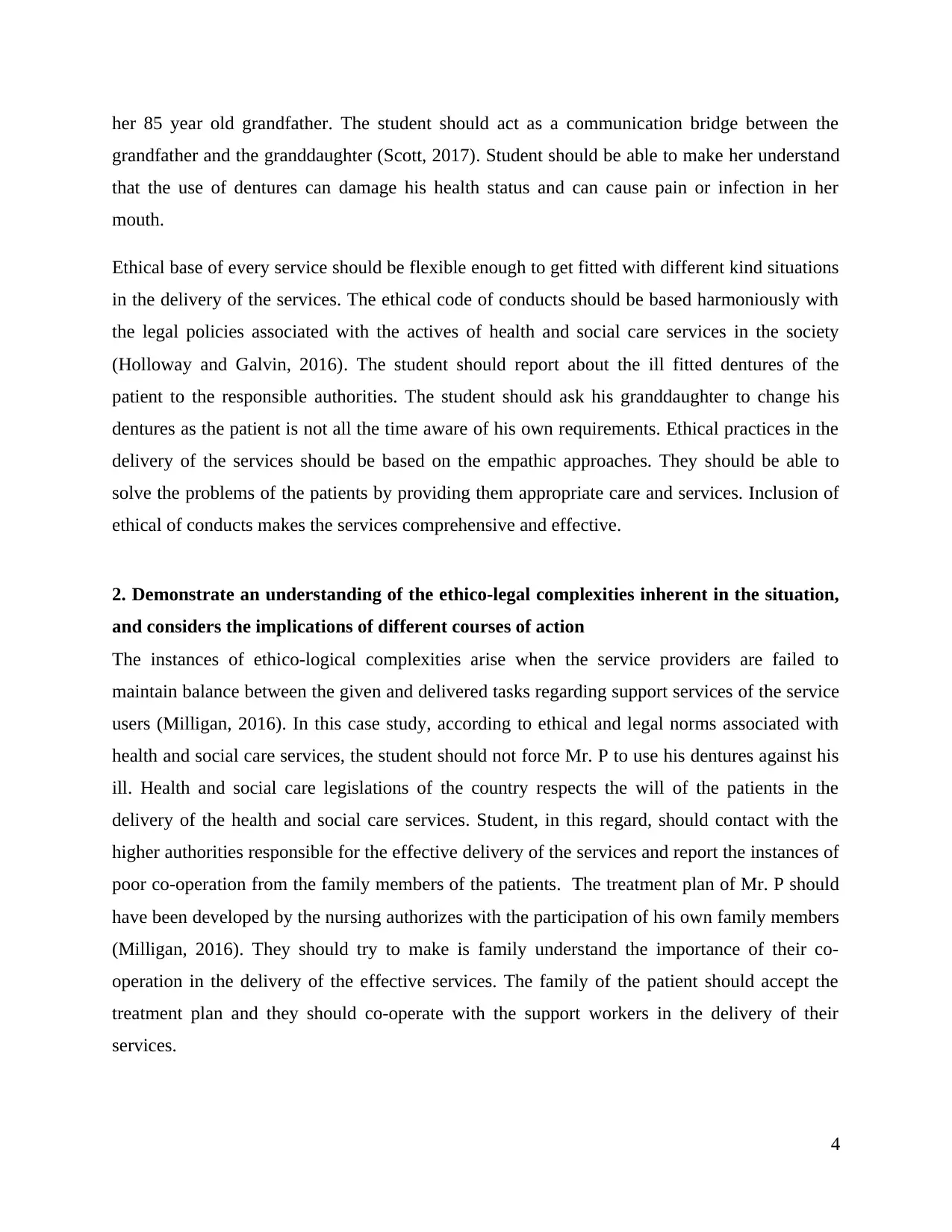
her 85 year old grandfather. The student should act as a communication bridge between the
grandfather and the granddaughter (Scott, 2017). Student should be able to make her understand
that the use of dentures can damage his health status and can cause pain or infection in her
mouth.
Ethical base of every service should be flexible enough to get fitted with different kind situations
in the delivery of the services. The ethical code of conducts should be based harmoniously with
the legal policies associated with the actives of health and social care services in the society
(Holloway and Galvin, 2016). The student should report about the ill fitted dentures of the
patient to the responsible authorities. The student should ask his granddaughter to change his
dentures as the patient is not all the time aware of his own requirements. Ethical practices in the
delivery of the services should be based on the empathic approaches. They should be able to
solve the problems of the patients by providing them appropriate care and services. Inclusion of
ethical of conducts makes the services comprehensive and effective.
2. Demonstrate an understanding of the ethico-legal complexities inherent in the situation,
and considers the implications of different courses of action
The instances of ethico-logical complexities arise when the service providers are failed to
maintain balance between the given and delivered tasks regarding support services of the service
users (Milligan, 2016). In this case study, according to ethical and legal norms associated with
health and social care services, the student should not force Mr. P to use his dentures against his
ill. Health and social care legislations of the country respects the will of the patients in the
delivery of the health and social care services. Student, in this regard, should contact with the
higher authorities responsible for the effective delivery of the services and report the instances of
poor co-operation from the family members of the patients. The treatment plan of Mr. P should
have been developed by the nursing authorizes with the participation of his own family members
(Milligan, 2016). They should try to make is family understand the importance of their co-
operation in the delivery of the effective services. The family of the patient should accept the
treatment plan and they should co-operate with the support workers in the delivery of their
services.
4
grandfather and the granddaughter (Scott, 2017). Student should be able to make her understand
that the use of dentures can damage his health status and can cause pain or infection in her
mouth.
Ethical base of every service should be flexible enough to get fitted with different kind situations
in the delivery of the services. The ethical code of conducts should be based harmoniously with
the legal policies associated with the actives of health and social care services in the society
(Holloway and Galvin, 2016). The student should report about the ill fitted dentures of the
patient to the responsible authorities. The student should ask his granddaughter to change his
dentures as the patient is not all the time aware of his own requirements. Ethical practices in the
delivery of the services should be based on the empathic approaches. They should be able to
solve the problems of the patients by providing them appropriate care and services. Inclusion of
ethical of conducts makes the services comprehensive and effective.
2. Demonstrate an understanding of the ethico-legal complexities inherent in the situation,
and considers the implications of different courses of action
The instances of ethico-logical complexities arise when the service providers are failed to
maintain balance between the given and delivered tasks regarding support services of the service
users (Milligan, 2016). In this case study, according to ethical and legal norms associated with
health and social care services, the student should not force Mr. P to use his dentures against his
ill. Health and social care legislations of the country respects the will of the patients in the
delivery of the health and social care services. Student, in this regard, should contact with the
higher authorities responsible for the effective delivery of the services and report the instances of
poor co-operation from the family members of the patients. The treatment plan of Mr. P should
have been developed by the nursing authorizes with the participation of his own family members
(Milligan, 2016). They should try to make is family understand the importance of their co-
operation in the delivery of the effective services. The family of the patient should accept the
treatment plan and they should co-operate with the support workers in the delivery of their
services.
4
Paraphrase This Document
Need a fresh take? Get an instant paraphrase of this document with our AI Paraphraser
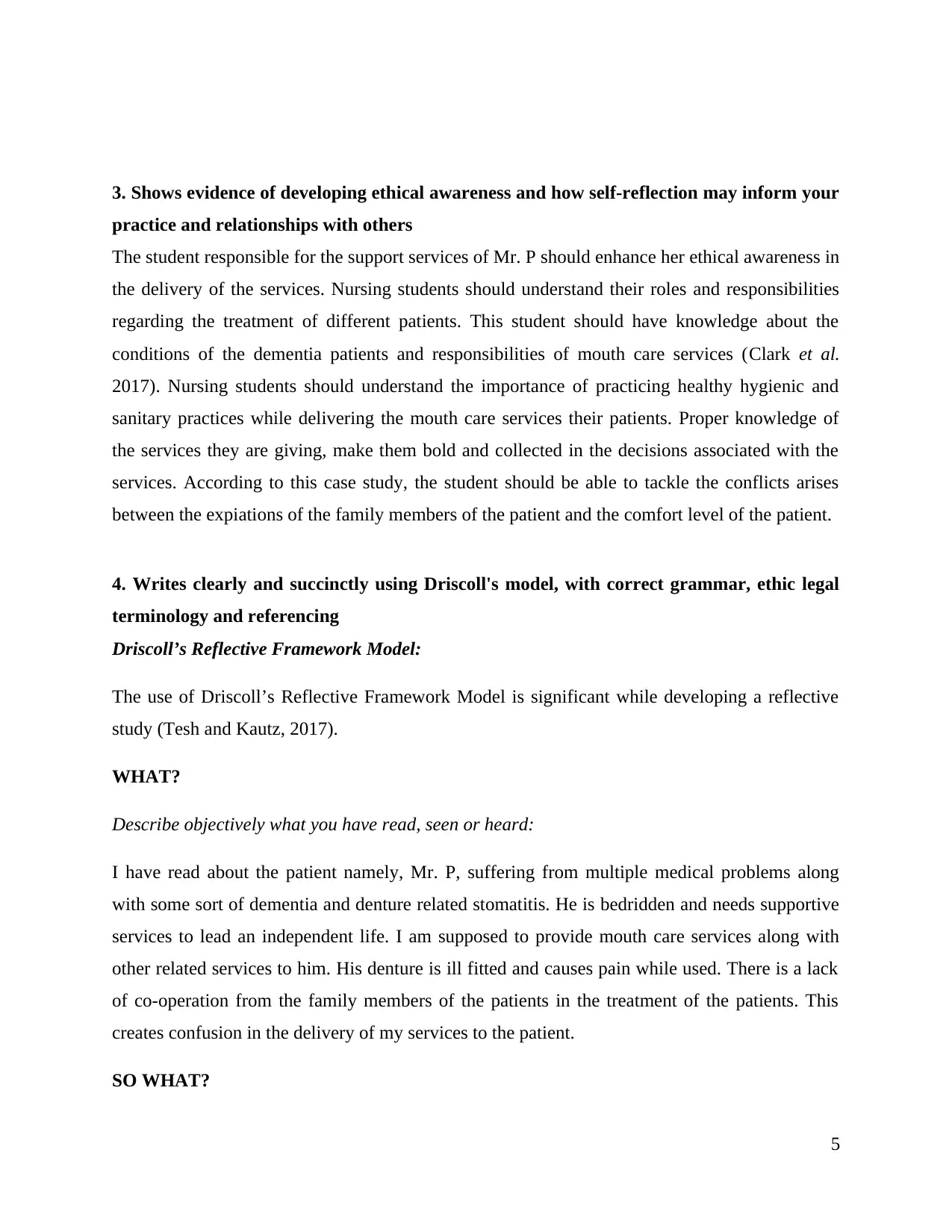
3. Shows evidence of developing ethical awareness and how self-reflection may inform your
practice and relationships with others
The student responsible for the support services of Mr. P should enhance her ethical awareness in
the delivery of the services. Nursing students should understand their roles and responsibilities
regarding the treatment of different patients. This student should have knowledge about the
conditions of the dementia patients and responsibilities of mouth care services (Clark et al.
2017). Nursing students should understand the importance of practicing healthy hygienic and
sanitary practices while delivering the mouth care services their patients. Proper knowledge of
the services they are giving, make them bold and collected in the decisions associated with the
services. According to this case study, the student should be able to tackle the conflicts arises
between the expiations of the family members of the patient and the comfort level of the patient.
4. Writes clearly and succinctly using Driscoll's model, with correct grammar, ethic legal
terminology and referencing
Driscoll’s Reflective Framework Model:
The use of Driscoll’s Reflective Framework Model is significant while developing a reflective
study (Tesh and Kautz, 2017).
WHAT?
Describe objectively what you have read, seen or heard:
I have read about the patient namely, Mr. P, suffering from multiple medical problems along
with some sort of dementia and denture related stomatitis. He is bedridden and needs supportive
services to lead an independent life. I am supposed to provide mouth care services along with
other related services to him. His denture is ill fitted and causes pain while used. There is a lack
of co-operation from the family members of the patients in the treatment of the patients. This
creates confusion in the delivery of my services to the patient.
SO WHAT?
5
practice and relationships with others
The student responsible for the support services of Mr. P should enhance her ethical awareness in
the delivery of the services. Nursing students should understand their roles and responsibilities
regarding the treatment of different patients. This student should have knowledge about the
conditions of the dementia patients and responsibilities of mouth care services (Clark et al.
2017). Nursing students should understand the importance of practicing healthy hygienic and
sanitary practices while delivering the mouth care services their patients. Proper knowledge of
the services they are giving, make them bold and collected in the decisions associated with the
services. According to this case study, the student should be able to tackle the conflicts arises
between the expiations of the family members of the patient and the comfort level of the patient.
4. Writes clearly and succinctly using Driscoll's model, with correct grammar, ethic legal
terminology and referencing
Driscoll’s Reflective Framework Model:
The use of Driscoll’s Reflective Framework Model is significant while developing a reflective
study (Tesh and Kautz, 2017).
WHAT?
Describe objectively what you have read, seen or heard:
I have read about the patient namely, Mr. P, suffering from multiple medical problems along
with some sort of dementia and denture related stomatitis. He is bedridden and needs supportive
services to lead an independent life. I am supposed to provide mouth care services along with
other related services to him. His denture is ill fitted and causes pain while used. There is a lack
of co-operation from the family members of the patients in the treatment of the patients. This
creates confusion in the delivery of my services to the patient.
SO WHAT?
5
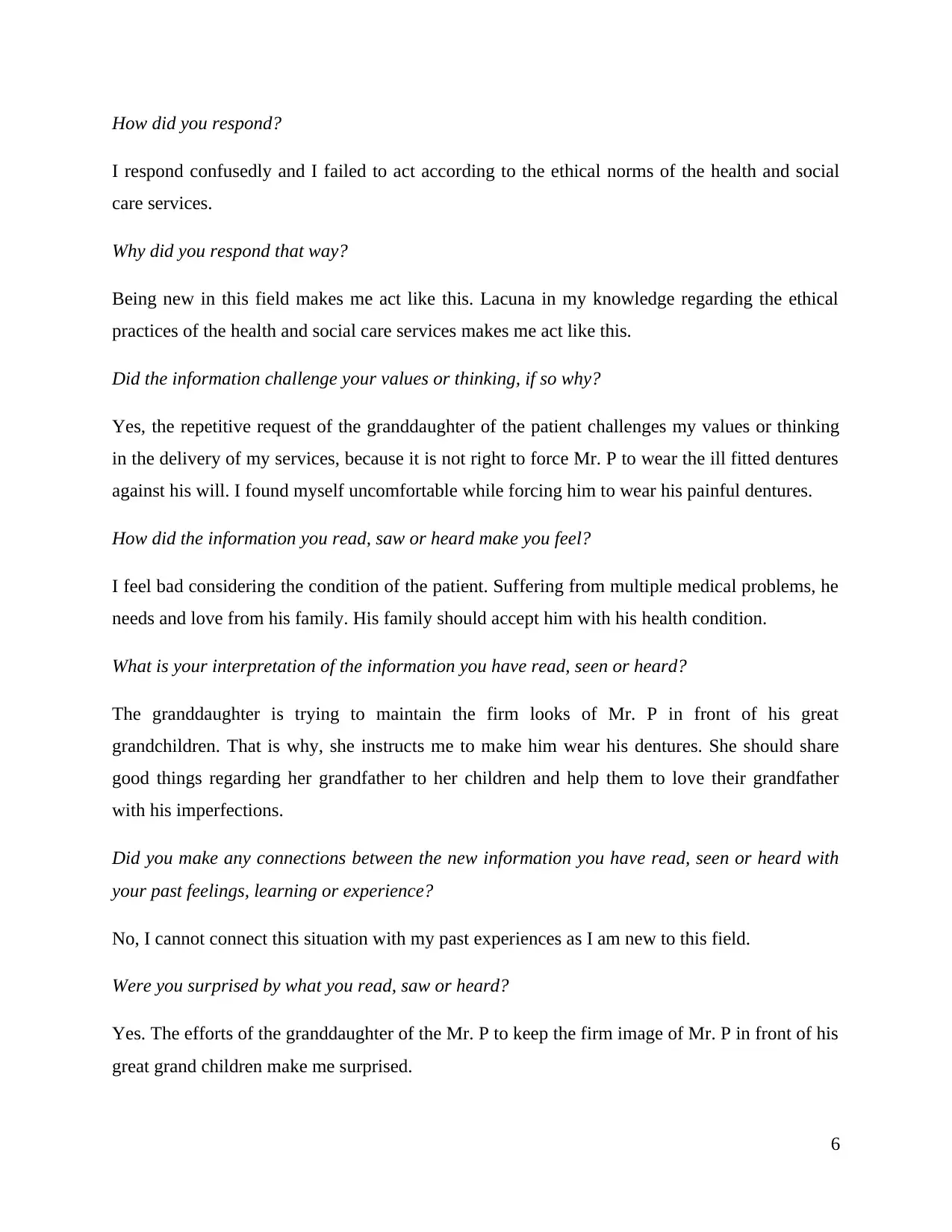
How did you respond?
I respond confusedly and I failed to act according to the ethical norms of the health and social
care services.
Why did you respond that way?
Being new in this field makes me act like this. Lacuna in my knowledge regarding the ethical
practices of the health and social care services makes me act like this.
Did the information challenge your values or thinking, if so why?
Yes, the repetitive request of the granddaughter of the patient challenges my values or thinking
in the delivery of my services, because it is not right to force Mr. P to wear the ill fitted dentures
against his will. I found myself uncomfortable while forcing him to wear his painful dentures.
How did the information you read, saw or heard make you feel?
I feel bad considering the condition of the patient. Suffering from multiple medical problems, he
needs and love from his family. His family should accept him with his health condition.
What is your interpretation of the information you have read, seen or heard?
The granddaughter is trying to maintain the firm looks of Mr. P in front of his great
grandchildren. That is why, she instructs me to make him wear his dentures. She should share
good things regarding her grandfather to her children and help them to love their grandfather
with his imperfections.
Did you make any connections between the new information you have read, seen or heard with
your past feelings, learning or experience?
No, I cannot connect this situation with my past experiences as I am new to this field.
Were you surprised by what you read, saw or heard?
Yes. The efforts of the granddaughter of the Mr. P to keep the firm image of Mr. P in front of his
great grand children make me surprised.
6
I respond confusedly and I failed to act according to the ethical norms of the health and social
care services.
Why did you respond that way?
Being new in this field makes me act like this. Lacuna in my knowledge regarding the ethical
practices of the health and social care services makes me act like this.
Did the information challenge your values or thinking, if so why?
Yes, the repetitive request of the granddaughter of the patient challenges my values or thinking
in the delivery of my services, because it is not right to force Mr. P to wear the ill fitted dentures
against his will. I found myself uncomfortable while forcing him to wear his painful dentures.
How did the information you read, saw or heard make you feel?
I feel bad considering the condition of the patient. Suffering from multiple medical problems, he
needs and love from his family. His family should accept him with his health condition.
What is your interpretation of the information you have read, seen or heard?
The granddaughter is trying to maintain the firm looks of Mr. P in front of his great
grandchildren. That is why, she instructs me to make him wear his dentures. She should share
good things regarding her grandfather to her children and help them to love their grandfather
with his imperfections.
Did you make any connections between the new information you have read, seen or heard with
your past feelings, learning or experience?
No, I cannot connect this situation with my past experiences as I am new to this field.
Were you surprised by what you read, saw or heard?
Yes. The efforts of the granddaughter of the Mr. P to keep the firm image of Mr. P in front of his
great grand children make me surprised.
6
⊘ This is a preview!⊘
Do you want full access?
Subscribe today to unlock all pages.

Trusted by 1+ million students worldwide
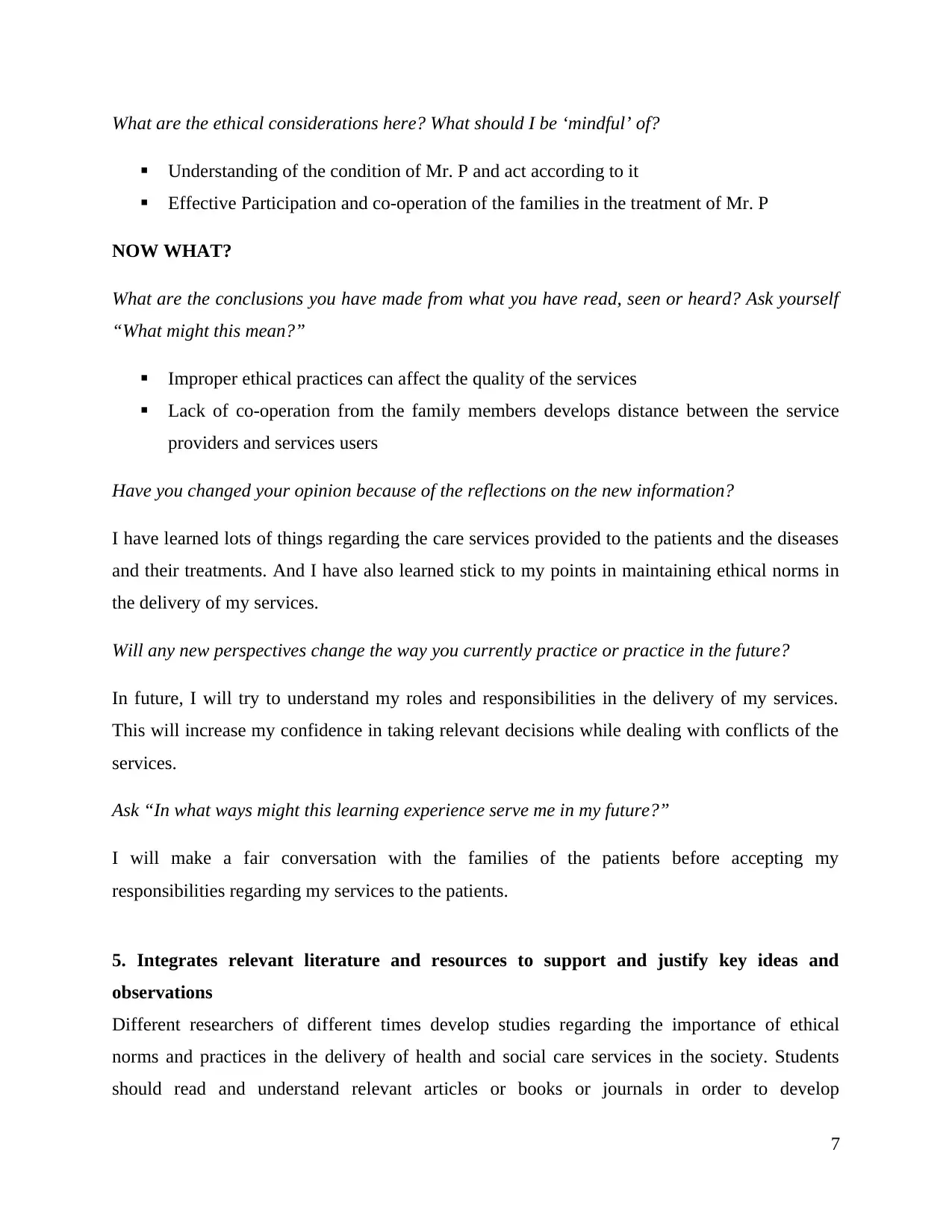
What are the ethical considerations here? What should I be ‘mindful’ of?
Understanding of the condition of Mr. P and act according to it
Effective Participation and co-operation of the families in the treatment of Mr. P
NOW WHAT?
What are the conclusions you have made from what you have read, seen or heard? Ask yourself
“What might this mean?”
Improper ethical practices can affect the quality of the services
Lack of co-operation from the family members develops distance between the service
providers and services users
Have you changed your opinion because of the reflections on the new information?
I have learned lots of things regarding the care services provided to the patients and the diseases
and their treatments. And I have also learned stick to my points in maintaining ethical norms in
the delivery of my services.
Will any new perspectives change the way you currently practice or practice in the future?
In future, I will try to understand my roles and responsibilities in the delivery of my services.
This will increase my confidence in taking relevant decisions while dealing with conflicts of the
services.
Ask “In what ways might this learning experience serve me in my future?”
I will make a fair conversation with the families of the patients before accepting my
responsibilities regarding my services to the patients.
5. Integrates relevant literature and resources to support and justify key ideas and
observations
Different researchers of different times develop studies regarding the importance of ethical
norms and practices in the delivery of health and social care services in the society. Students
should read and understand relevant articles or books or journals in order to develop
7
Understanding of the condition of Mr. P and act according to it
Effective Participation and co-operation of the families in the treatment of Mr. P
NOW WHAT?
What are the conclusions you have made from what you have read, seen or heard? Ask yourself
“What might this mean?”
Improper ethical practices can affect the quality of the services
Lack of co-operation from the family members develops distance between the service
providers and services users
Have you changed your opinion because of the reflections on the new information?
I have learned lots of things regarding the care services provided to the patients and the diseases
and their treatments. And I have also learned stick to my points in maintaining ethical norms in
the delivery of my services.
Will any new perspectives change the way you currently practice or practice in the future?
In future, I will try to understand my roles and responsibilities in the delivery of my services.
This will increase my confidence in taking relevant decisions while dealing with conflicts of the
services.
Ask “In what ways might this learning experience serve me in my future?”
I will make a fair conversation with the families of the patients before accepting my
responsibilities regarding my services to the patients.
5. Integrates relevant literature and resources to support and justify key ideas and
observations
Different researchers of different times develop studies regarding the importance of ethical
norms and practices in the delivery of health and social care services in the society. Students
should read and understand relevant articles or books or journals in order to develop
7
Paraphrase This Document
Need a fresh take? Get an instant paraphrase of this document with our AI Paraphraser

understanding of the specific area of services (Bryant‐Lukosius et al. 2016). Ethical code of
conducts should be integrated with key features and observations related to the services while
practicing the same.
8
conducts should be integrated with key features and observations related to the services while
practicing the same.
8
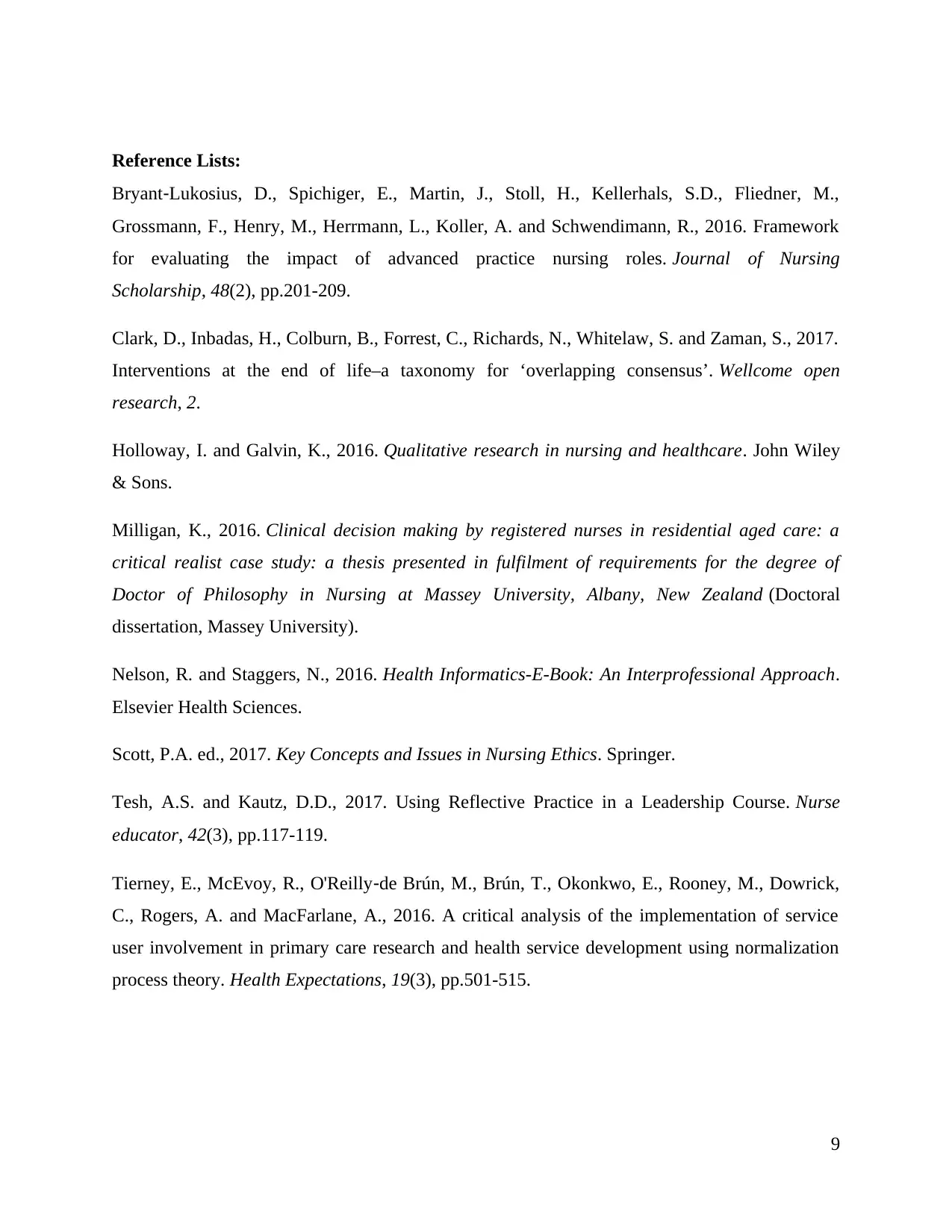
Reference Lists:
Bryant‐Lukosius, D., Spichiger, E., Martin, J., Stoll, H., Kellerhals, S.D., Fliedner, M.,
Grossmann, F., Henry, M., Herrmann, L., Koller, A. and Schwendimann, R., 2016. Framework
for evaluating the impact of advanced practice nursing roles. Journal of Nursing
Scholarship, 48(2), pp.201-209.
Clark, D., Inbadas, H., Colburn, B., Forrest, C., Richards, N., Whitelaw, S. and Zaman, S., 2017.
Interventions at the end of life–a taxonomy for ‘overlapping consensus’. Wellcome open
research, 2.
Holloway, I. and Galvin, K., 2016. Qualitative research in nursing and healthcare. John Wiley
& Sons.
Milligan, K., 2016. Clinical decision making by registered nurses in residential aged care: a
critical realist case study: a thesis presented in fulfilment of requirements for the degree of
Doctor of Philosophy in Nursing at Massey University, Albany, New Zealand (Doctoral
dissertation, Massey University).
Nelson, R. and Staggers, N., 2016. Health Informatics-E-Book: An Interprofessional Approach.
Elsevier Health Sciences.
Scott, P.A. ed., 2017. Key Concepts and Issues in Nursing Ethics. Springer.
Tesh, A.S. and Kautz, D.D., 2017. Using Reflective Practice in a Leadership Course. Nurse
educator, 42(3), pp.117-119.
Tierney, E., McEvoy, R., O'Reilly‐de Brún, M., Brún, T., Okonkwo, E., Rooney, M., Dowrick,
C., Rogers, A. and MacFarlane, A., 2016. A critical analysis of the implementation of service
user involvement in primary care research and health service development using normalization
process theory. Health Expectations, 19(3), pp.501-515.
9
Bryant‐Lukosius, D., Spichiger, E., Martin, J., Stoll, H., Kellerhals, S.D., Fliedner, M.,
Grossmann, F., Henry, M., Herrmann, L., Koller, A. and Schwendimann, R., 2016. Framework
for evaluating the impact of advanced practice nursing roles. Journal of Nursing
Scholarship, 48(2), pp.201-209.
Clark, D., Inbadas, H., Colburn, B., Forrest, C., Richards, N., Whitelaw, S. and Zaman, S., 2017.
Interventions at the end of life–a taxonomy for ‘overlapping consensus’. Wellcome open
research, 2.
Holloway, I. and Galvin, K., 2016. Qualitative research in nursing and healthcare. John Wiley
& Sons.
Milligan, K., 2016. Clinical decision making by registered nurses in residential aged care: a
critical realist case study: a thesis presented in fulfilment of requirements for the degree of
Doctor of Philosophy in Nursing at Massey University, Albany, New Zealand (Doctoral
dissertation, Massey University).
Nelson, R. and Staggers, N., 2016. Health Informatics-E-Book: An Interprofessional Approach.
Elsevier Health Sciences.
Scott, P.A. ed., 2017. Key Concepts and Issues in Nursing Ethics. Springer.
Tesh, A.S. and Kautz, D.D., 2017. Using Reflective Practice in a Leadership Course. Nurse
educator, 42(3), pp.117-119.
Tierney, E., McEvoy, R., O'Reilly‐de Brún, M., Brún, T., Okonkwo, E., Rooney, M., Dowrick,
C., Rogers, A. and MacFarlane, A., 2016. A critical analysis of the implementation of service
user involvement in primary care research and health service development using normalization
process theory. Health Expectations, 19(3), pp.501-515.
9
⊘ This is a preview!⊘
Do you want full access?
Subscribe today to unlock all pages.

Trusted by 1+ million students worldwide
1 out of 9
Related Documents
Your All-in-One AI-Powered Toolkit for Academic Success.
+13062052269
info@desklib.com
Available 24*7 on WhatsApp / Email
![[object Object]](/_next/static/media/star-bottom.7253800d.svg)
Unlock your academic potential
Copyright © 2020–2026 A2Z Services. All Rights Reserved. Developed and managed by ZUCOL.



